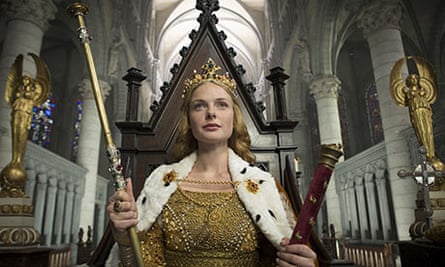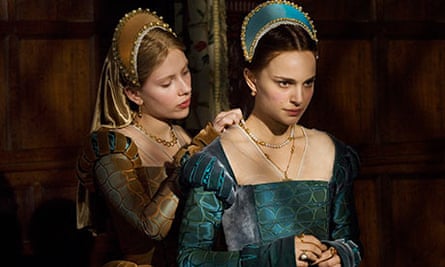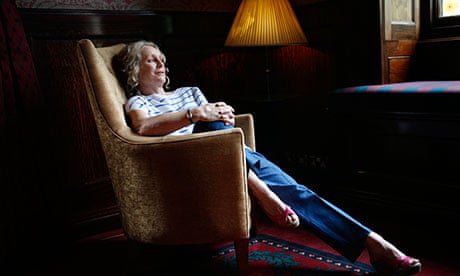I am on the train to North Yorkshire where Philippa Gregory lives and have been so engrossed by her latest novel, I'm pages from the end when I alight at Yarm station. The White Princess takes over from where The White Queen, subject of the BBC drama series about the War of the Roses, leaves off and I have been wondering what sort of queen Gregory would make. It is the sort of game you start to play after immersion in her historical fiction – everyone I look at seems Plantagenet material.
We meet at a country house hotel not far from where she lives because of upheaval at home: she is building a barn on her 100-acre farm. She is the first person I see as I walk through grand stone portals to the reception. At 59, Gregory has an animated face framed by blonde curls. Although casually dressed for our mid-morning tea, her matching fuschia sandals and bag suggest she enjoys dressing up. She has queen potential – you can tell she knows her own mind, but she might have to work on being less friendly. We bond immediately over Max Irons, son of Jeremy, who plays the ludicrously dishy Edward IV in The White Queen and was recently quoted as saying: "Philippa Gregory – she can tell a story."
His compliment is an understatement; Gregory has written 24 novels and two books for young adults since 1987. Her Plantagenet series is five books strong and keeps turning like Fortune's wheel: the cast changes, but the narrative spokes stay the same – the pursuit of power, arranged marriages, a need for male heirs, swerving political loyalties. Gregory's audience of 10 million reads on.
The TV mini-series of The White Queen is also gorgeously escapist and has attracted swathes of viewers (the first episode was greeted by 5.3 million). Critics have swiped at its anachronisms: zips, hand rails and French manicures have all been spotted and the White Queen's clothes are "too white". Gregory recognises, as one of the show's producers, that television will "do something different from the novel", but you sense these difficulties would not have arisen in her meticulously researched fiction.
I ask her whether total historical accuracy is desirable in television anyway; surely the actors would all be short and have bad teeth? "Well, actually, their teeth would be good," she says. "You don't really get the rotting teeth until the Tudor period when the big explosion of imported sugar comes in. And they'd have washed more than we traditionally think. Their clothes would have been brushed and aired." Would we understand them though? "No. They'd speak a regional dialect of English but prefer to speak French, or they'd be happy to fall back on Latin."
While the extent of Gregory's Latin is unclear, her academic credentials are listed on the new book's dust jacket: a graduate from Sussex with a PhD, alumna of the year 2009 at Edinburgh. Her publisher adds that her "commitment to historical accuracy" is a hallmark. Off the jacket, David Starkey dubs her novels "good Mills & Boon." Her rejoinder: "You sell much more fiction than you do history." Starkey's comment is sour grapes, "entirely and understandably so", and she points out that the great historian Eric Ives's biography of Anne Boleyn only came back into print because her novel The Other Boleyn Girl was made into a film (with Scarlett Johansson and Natalie Portman). History, she reflects, must always involve imagination. "Even a historian who prides himself on rectitude as much as Starkey, if you read his history of Elizabeth, you see the creation of a partly imaginary character."

Her added skill is that her writing flows effortlessly, to the point where some readers have told Gregory they are convinced she writes under hypnosis. Others insist she must have mastered a computer program on how to write bestsellers. They want to know her secret. She reflects: "You're a storyteller before you can write." She remembers telling her mother stories "in an orderly fashion" as a child and mentions, too, her training as a journalist in Cardiff, after leaving school. But the reality is that the facility with which she writes is earned. She works hard. She researches comprehensively, reading everything available about her characters and their world. She ends up with "a ring binder folder of notes" equivalent in bulk to "what you might tackle in the first two years of undergraduate study" and her question is always: "What do I not know about this world?"
Does the weight of that research ever make it hard for her to write? "I try to read so much I know it, until it becomes almost like a memory. A common error in historical fiction," she says, "is for people to do the research but never digest it."
I do not admit to auditioning her for the role of queen but ask which of her characters she would choose to be if given the chance. "Elizabeth Woodville," she says without hesitating. "She marries the man she loves – Edward IV – manages to survive, gives him a dozen children. She has a supportive family. Her husband was unfaithful, but he is a medieval king so he was bound to be. For the years of her ascendancy, she has a fantastic life. She also has terrible reversals – losing her two boys must have been unbearable, but she sees her daughter on the throne as Queen of England."
The story of the White Princess, Elizabeth's daughter and subject of the new novel, is more complex: "While The White Queen is almost a Cinderella story, her daughter's life is more ambivalent. Elizabeth of York marries Henry Tudor, a conquering King, enemy of her house. Their marriage unfolds slowly, works towards unity. She comes to understand him and I think when you understand someone, you always love them a bit."
Writing as a feminist, Gregory always puts women centre stage in her work. But were they central – or does she write with wishful hindsight? "The more research I do, the more I think there is an untold history of women." She says that whenever she writes about a remarkable woman, people comment that the woman was "exceptional". But she thinks there were lots of remarkable women "striving for their lives, trying to satisfy their own needs". She is fascinated by the way patriarchy operates: "In the medieval world, patriarchy is naked. Nobody pretends to respect women. Women are criticised as sexually uncontrollable or stupid. In our society, you'll sometimes get a remnant of this – you know, when a man wants to help park your car. It is an absolute insult."
She has a robust directness. The more we talk, the more I like her. I've also got wind of another, less obvious, way into her writing than the championing of women – a love of horses. She has four, rides every day on the North York moors, and "all the people I write about have to ride to get anywhere". Sometimes, riding in a quiet wood, she will have a moment when she thinks: "It must have been just like this. Only they would have been riding all day." She adds that she often thinks about writing while riding: "Your body is engaged but your mind is freed, and horses, for me and my characters, are an emblem of freedom." I ask whether women rode astride then as Margaret Beaufort does on TV and she treats me to a mini-lesson on the side-saddle, "a later development brought in from the French court by Anne Boleyn."

Her third husband, Anthony Mason, is from the north. "He's a northerner who couldn't possibly go south of Hull," she laughs. They moved to their Yorkshire farm eight years ago and although "not by nature or nurture farmers" they now run an arable farm, "a real joy". Their children – Gregory has a daughter of 32, a son of 20 and four stepchildren, the youngest being 17 – are almost all grown up. She takes out her phone to show me her "adorable" grandson Freddie, then her dapple grey Connemara. She treasures gardening, too, and says that beyond the "hollow wall" of her own gardens, where there are blue irises, lupins and geraniums, she has woodland ponds where she raises ducks and has a pair of swans. Thirty years ago, she founded a charity, Gardens for the Gambia, that has paid for 180 wells in African primary schools. She was in Gambia researching her novel on 18th- century slavery, A Respectable Trade. She also has an African connection of her own – her father was a navigator for East African Airways and the family moved from Nairobi to Bristol when she was two. "My mother was brought up in a large country house in Somerset, my father was the son of a brickyard manager in Plymouth. When Hitler invaded Poland, they were called up and met in uniform near an air force base – my father joined the RAF."
Their story reflects, she says, her own take on history – the way individual lives are shaped by national events: "Geographically they had been apart, socially they were incredibly apart. If Hitler hadn't invaded Poland, they would never have met or married and I would never have been born."
Growing up, she was optimistic about getting married: "I was living with my first husband by the time I was 19. He was at my 18th birthday which seems extraordinary." But she implies she has struggled with compromise. Third time round, she is "getting better" at it. "I suppose I have a vision of how I like the world to be and try and get that to happen," she laughs.
She is already at work on the next novel – about Margaret Pole, Countess of Salisbury, cousin to the White Princess. Can she pin down why historical fiction is so popular – addictive even? "Some people must read with their hair standing on end thinking, 'Thank God we have contraception, sanitation, penicillin.' Others look at the costumes, revels and folderol and think: 'How glorious is that?'"
Whatever the case, our time is up. Although I am sorry to be saying goodbye I won't pretend not to be looking forward to the train journey home because Henry Tudor is about to be attacked, is barely speaking to the White Princess and a dangerously charming "York boy" is about to appear over the horizon.
Philippa Gregory's The White Princess is published by Simon & Schuster on 1 August at £20. To order a copy for £16, with free UK p&p, click on the link . The White Queen is out on DVD on 19 August

Comments (…)
Sign in or create your Guardian account to join the discussion